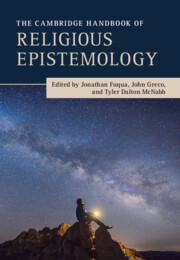Book contents
- The Cambridge Handbook of Religious Epistemology
- Cambridge Handbooks in Philosophy
- The Cambridge Handbook of Religious Epistemology
- Copyright page
- Contents
- Tables
- Contributors
- Introduction
- Part I Faith and Rationality
- Part II Religious Traditions
- Part III New Directions
- 13 Trust, Testimony, and Religious Belief
- 14 Religious Disagreement
- 15 Franciscan Knowledge
- 16 Liturgically Infused Practical Understanding
- 17 Knowledge-First Epistemology and Religious Belief
- 18 Epistemic Disjunctivism and Religious Knowledge
- 19 Debunking Arguments and Religious Belief
- References
- Index
15 - Franciscan Knowledge
from Part III - New Directions
Published online by Cambridge University Press: 24 August 2023
- The Cambridge Handbook of Religious Epistemology
- Cambridge Handbooks in Philosophy
- The Cambridge Handbook of Religious Epistemology
- Copyright page
- Contents
- Tables
- Contributors
- Introduction
- Part I Faith and Rationality
- Part II Religious Traditions
- Part III New Directions
- 13 Trust, Testimony, and Religious Belief
- 14 Religious Disagreement
- 15 Franciscan Knowledge
- 16 Liturgically Infused Practical Understanding
- 17 Knowledge-First Epistemology and Religious Belief
- 18 Epistemic Disjunctivism and Religious Knowledge
- 19 Debunking Arguments and Religious Belief
- References
- Index
Summary
In “Francis and Dominic: Persons, Patterns, and the Trinity,” Eleonore Stump introduces the term “Franciscan knowledge” for a type of nonpropositional knowledge that includes certain sorts of self-knowledge; knowing music (without being able to identify it); knowledge of other persons through second-person experience and narratives; and, perhaps most importantly, knowledge of God (2000). In Wandering in Darkness (2010), Stump appeals to Franciscan knowledge in her response to the problem of evil, and a number of other philosophers (e.g., Benton, Duncan, and Efird, and Worsley) interact with Stump’s account in their accounts of nonpropositional knowledge, interpersonal knowledge, and knowledge of God. This chapter explains the notion of Franciscan knowledge and discusses some of the ways it has influenced recent work in the philosophy of religion. Since the claim that there is irreducibly nonpropositional knowledge is controversial, the chapter also defends the very existence of Franciscan knowledge.
Keywords
- Type
- Chapter
- Information
- The Cambridge Handbook of Religious Epistemology , pp. 224 - 240Publisher: Cambridge University PressPrint publication year: 2023

